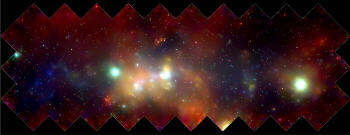|

Revised: July 25, 2008
from
Chandra Website
 
Credit:
NASA/UMass/D.Wang et al.
This 400 by 900 light-year mosaic of several Chandra images of the
central region of our Milky Way galaxy reveals hundreds of
white dwarf stars, neutron stars, and black holes bathed in an
incandescent fog of multimillion-degree gas.
The super-massive
black hole at the center of the
Galaxy is located inside the bright white patch in the center of the
image. The colors indicate X-ray energy bands - red (low), green
(medium), and blue (high).
The mosaic gives a new perspective on how the turbulent Galactic
Center region affects the evolution of the Galaxy as a whole.
This hot gas appears to be escaping from the center into the rest of
the Galaxy. The outflow of gas, chemically enriched from the
frequent destruction of stars, will distribute these elements into
the galactic suburbs.
Because it is only about 26,000 light
years from Earth, the center of our Galaxy provides an excellent
laboratory to learn about the cores of other galaxies.
|
Fast Facts for Galactic
Center Survey |
|
Credit |
NASA/UMass/D.Wang et al. |
|
Scale |
Image is 120 by 48 arcmin |
|
Category |
Normal Galaxies & Starburst
Galaxies,
Milky Way Galaxy
|
|
Coordinates (J2000) |
RA
17h 45m 23s | Dec -29° 01' 17.00 |
|
Constellation |
Sagittarius |
|
Observation Dates |
July 2001 (30 separate pointings) |
|
Observation Time |
94
hours total |
|
Obs. IDs |
2267 through 2296 |
|
Color Code |
Energy |
|
Instrument |
ACIS |
|
Distance Estimate |
About 26,000 light years |
|
Release Date |
January 09, 2002 |
|


